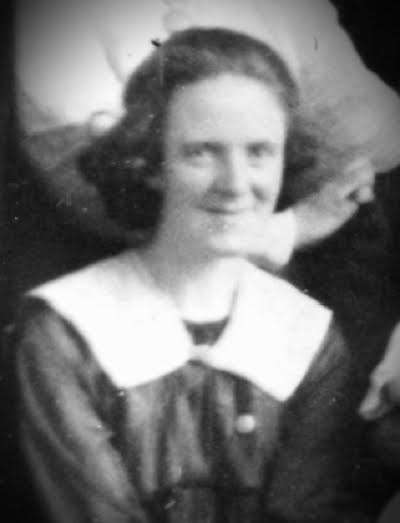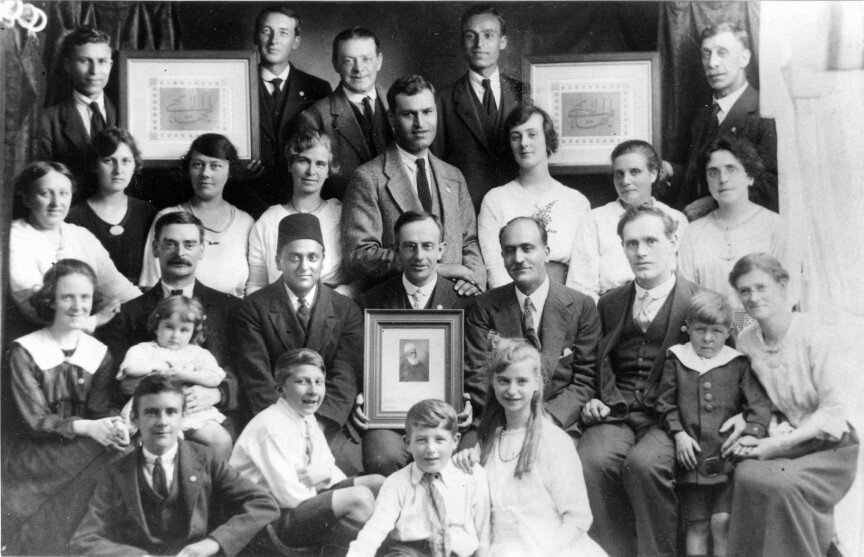Highlighting Australia
- As a proudly Australian initiative, we’re excited to showcase a collection of Australian stories, music, tributes and more.

Join activities, celebrations, study groups, spiritual empowerment and education programs for young people, and more.
Baha’i beliefs address essential spiritual themes for humanity’s collective and individual advancement. Learn more about these and more.


As a young girl, Nora was admired for her beautiful hair. It was a rich auburn color and so long that it almost reached as far as the hem of her dress. Every night and every morning, Nora’s mother would brush it for an hour until it shone like gold. Artists travelled from across the North of England to paint Nora’s portrait. Into adulthood, she considered her hair her only redeeming feature.
Nora Crossley was born in Old Trafford, Manchester in 1893 into a wealthy family. But her childhood was not a happy one and her adulthood was equally severely difficult. After the First World War, she married her penniless childhood sweetheart against her separated parents’ wishes. War had irrevocably changed her husband. He was later diagnosed as schizophrenic, but at that point his erratic behaviour was beyond any explanation. He refused to return to work, preferring to play the organ and repair hymn books for the church, but never accepting any payment. So began more than 50 years of severe tests at home for Nora, who soon became a mother to two sons.
When she encountered the Baha’i Faith, Nora was scrubbing café floors for ten shillings a week in order to feed her children and to keep a roof of some sort over the family’s heads. On the morning of Tuesday 24 May 1920, Nora had reached breaking point. Unable to take any more, she walked out leaving her husband sitting in front of the fire with the boys. Throughout the day she tramped the streets, heedless of the pouring rain that was soaking through her clothes. But when dusk fell, she knew she had to go home for the sake of her children. On the tram, she picked up the evening newspaper and an advertisement caught her eye. There was a lecture about the Holy Land happening that night. Nora had always been deeply religious and interested in anything to do with the Holy Land. If only she could attend the lecture before she went home, she thought, it might raise her drooping spirits a little.
Nora got off the tram and made her way to the Raglan Café in Mosely Street. The speaker impressed her greatly and afterwards Edward T. Hall, one of the early Manchester Baha’is, asked her how she liked the meeting. She told him she was thrilled at everything she had heard, “But who is this Abdu’l-Baha the speaker kept referring to?” she enquired. Hall laughed and suggested, as the hour was late, that Nora have tea with him and his wife the next day when they could tell her more.
“I went home as though walking on air,” Nora later wrote, “and my husband was astonished when he saw my face – as it was very different to what he had anticipated.”
The next day, and for days afterwards, she went to the Halls’ home to learn about the Baha’i Faith which she soon readily embraced. Nora’s new Baha’i friends were distressed at the poverty-stricken way in which she and her family were living and offered help. But Nora refused. “It is extraordinary how proud one can be when one has NOTHING,” she wrote.
At that time, there was much talk among the Baha’is of the plans to build the Mashriqu’l-Adhkar—the Mother Temple of the West—in Wilmette, near Chicago. The prominent early British believer Dr. Esslemont was appealing for funds. All of the Manchester friends were contributing but Nora had no means of any kind and felt embarrassed and unhappy. But she did possess just one thing that might be valuable; she knew that hairdressers would offer a good deal of money for hair of her colour. “It was a sacrifice,” she wrote, “as it was the only beauty I had, but I had nothing else to give. So I cut it off…It was just a simple action on my part. All I was conscious of, was to try and do something to please the Beloved Master; but even I never dreamt how far-reaching the effects were going to be.”
Nora parcelled her hair up and sent it to Doctor Esslemont, along with a note:
I am a stranger to you personally but have recently joined the Manchester Baha’is and have heard a great deal of you from Mr Hall. He told me about the Mashriqu’l-Adhkar—that you are the Collector for it in England, therefore I am sending you my share, small though it is. You may think mine a very strange share, but I am poor, and penniless, so I have cut off my hair and wish you to sell it for me. Hairdressers are only too anxious to obtain hair my colour, but it cost me a great deal to cut off and I feel I could not possibly sell it myself. If it only does a little good, I shall be content. It has been a sacrifice I admit, as it was the only beauty I possessed but it is nothing to what the Beloved Master has given me. He has given me a wonderful, boundless joy that no one can take from me. He has also chosen me for a great part in spreading the Cause and I am trying to make myself as worthy as possible of His trust.
At present I am very incompetent but He is training me in His own way. My deep gratitude to the other Baha’is who have shown me so much sympathy passeth all understanding, in my need – and I am only too anxious to do some little service for the Cause in return. It is only a small gift but it is all I possess so I hope you will be able to make use of it in some way and send the proceeds to the Mashriqu’l-Adhkar. If you ever know of anything I can do to help the Cause I will even give my life if need be—for it belongs to the Beloved Master after all.
Deeply moved, Dr. Esslemont showed Nora’s gift to his fellow believers.
He also wrote a letter to his friend Lutfullah Hakim in Haifa telling him about Nora’s gift. He, in turn, shared the news with the ladies of the Holy Household. While they were reading Dr. Esslemont’s letter in the garden, Abdu’l-Baha came by and asked them what they were reading. Dr. Hakim read the letter to the Master. “I must write to her at once,” Abdu’l-Baha responded. There and then, He penned His first Tablet to Nora Crossley, the paper resting on the palm of His hand. Dr. Hakim translated it and sent Nora a copy signed by Abdu’l-Baha. “O MY well-beloved daughter of the Kingdom!” He had written,
The letter thou hadst written to Dr. Esslemont was forwarded by him to the Land of Desire [The Holy Land]. I read it all through with the greatest attention. On the one hand, I was deeply touched, for thou hadst sheared off those fair tresses of thine with the shears of detachment from this world and of self-sacrifice in the path of the Kingdom of God. And on the other, I was greatly pleased, for that dearly beloved daughter hath evinced so great a spirit of self-sacrifice as to offer up so precious a part of her body in the pathway of the Cause of God. Hadst thou sought my opinion, I would in no wise have consented that thou shouldst shear off even a single thread of thy comely and wavy locks; nay, I myself would have contributed in thy name for the Mashriqu’l-Adhkar. This deed of thine is, however, an eloquent testimony to thy noble spirit of self-sacrifice. Thou hast, verily, sacrificed thy life and great will be the spiritual results thou shalt obtain. Rest thou confident that day by day thou shalt progress and wax greater in firmness and in constancy. The bounties of Baha’u’llah shall compass thee about and the joyful tidings from on high shall time and again be imparted unto thee. And though it be thine hair that thou hast sacrificed, yet thou shalt be filled with the Spirit, and though it be this perishable member of thy body which thou hast laid down in the path of God, yet thou shalt find the Divine Gift, shalt behold the Celestial Beauty, obtain imperishable glory and attain unto everlasting life.
Just a few months had passed since Nora had encountered the Baha’i Faith when she learned that Abdu’l-Baha’s beloved grandson, Shoghi Effendi—who was in England to pursue his studies at Oxford University—was to pay a visit to Manchester.
Shoghi Effendi had a particular task in mind for his first meeting with the Manchester friends. He presented Nora with gifts from Abdu’l-Baha: a lovely Persian silk handkerchief with a tiny photo of Himself folded within it and a beautiful Baha’i ring that she would always wear. He then read to the gathering a Tablet addressed to the Baha’is in Najafabad, Iran, which specifically mentioned Nora’s donation to the building of the Temple. Despite his general preference to avoid photographs, Shoghi Effendi specifically requested that a photograph should be taken of him with the friends. Nora spent a whole week accompanying the future Guardian of the Faith from one place to another. She considered it one of the greatest weeks of her whole life.

Over the following years, Nora’s personal and family problems deepened and she felt obliged to distance herself from the community that she had loved so passionately. For many decades, she lived a devoted Baha’i life alone while looking after her husband and her sons. It was not until her old age, after her husband’s passing, that Nora re-established contact with the community, and was surprised to be shown the same quality of love and affection she had received some 50 years earlier, although many of her first Baha’i friends were no longer living.
Time had brought Nora maturity and deepened her faith, and “throughout the long years of loneliness and trial,” she wrote at the end of her life, “the Beloved Master has never left me. He promised, that when He passed away, He would always help and guide me, from the Other side of life—as He had always done in this—and He has never failed me. My one hope now is that I shall never fail HIM.”
Nora passed away in 1977 at the age of 84, her name immortalised for the singular sacrifice she made in 1920, of donating her most precious possession, her beautiful hair, to the raising up of the Mother Temple of the West. It was indeed an act that ensured for Nora Crossley, “imperishable glory.”
Sources:
"*" indicates required fields

We recognise their continuing connection to land, waters and community. We pay our respects to Aboriginal and Torres Strait Islander people and their cultures; and to elders both past and present.
The views expressed in our content reflect individual perspectives and do not represent authoritative views of the Baha’i Faith.

Visit the site of the
Australian Baha’i Community
and the Baha’i Faith Worldwide
Notifications
Such a beautiful & inspiring story!! Especially as we profoundly reflect on the life of the Master this year and our own service & sacrifices. Thank you Rob Weinberg!
Beverley Evans Matthews (June 6, 2021 at 2:19 PM)
Such a beautiful and touching story. Thank you.
Wendi Momen (June 6, 2021 at 3:44 PM)
The Tablets in Persian are in “منتخباتی از مکاتیب حضرت عبدالبهاء صفحه 94 لوح شماره 62 و لوح نجف اباد و غیره”
Firooz Oskooi (June 6, 2021 at 6:02 PM)
Thank you so much, Rob, for sharing this story. I had never heard of Nora Crossly and this is such a touching story of sacrifice and love. I will share it with the Treasurer of our Local Assembly and hopefully it will spread to inspire the gift of sacrifice in others too. Nora’s influence will surely be immortal. I love this quote by Shoghi Effendi: “Sacrifices in the path of one’s religion produce always immortal results, ‘Out of the ashes rises the phoenix’.”
Lorraine Manifold (June 6, 2021 at 10:24 PM)
Having read this Tablet a few times i never knew anything about its recipient. Thank you for sharing this deeply moving story of Noras life and her sacrifice it is a powerful testimony to true love and enduring faith another precious gem to be treasured and shared always.
Lynne (June 6, 2021 at 1:09 AM)
Very touching and emotional story. To me this is the essence of
faith and accomplishment. Thank
Firooz R. Oskooi (June 6, 2021 at 3:10 AM)
Wonderful story, Rob. Have you seen Shoghi Effendi’s letters to ‘Abdu’l-Bahá about this and the Manchester community, in Riaz KAhden’s book Prelude to the Guardianship?
May Hofman (June 6, 2021 at 7:31 AM)
The ring given to Nora was returned to the Faith Sima & I had been asked by the NSA to return and be of service we were sent to the Liverpool area. At that time the Issac & Pauline DeCruz were there. A man and to the Centre and wanted to know how much the Baha’is would give him for his Grandma’s ring. Issac told him the story of how she got the ring and the respect for her in the Baha’i community. The man got up to leave Issac pointed to the ring. The man simply said the the ring is where it should be
Derek Cockshut (June 6, 2021 at 3:27 PM)
This story was wonderful thank you! I am going to share this story with my daughters. They are young and love hearing stories of heroines of the faith. I also appreciate learning of Nora’s great personal struggles and her courage to overcome them and continue on her spiritual path while still remaining a dutiful mother and wife. So encouraging and a story of our human condition many of us can identify with.
Kristen Graham (June 6, 2021 at 4:22 PM)
Really good to see this article about Nora Crossley on Baha’i Blog this morning. Manchester has produced so many amazing Baha’is over the years. Nora Crossleys name will undoubtedly reverberate over the centuries in recalling her sacrifice in cutting her beautiful golden locks – so that a donation could be given to the raising of the building of the Baha’i House of Worship in Wilmette.
Thelma Batchelor (June 6, 2021 at 4:59 PM)
Beautiful photo of Shoghi Effendi and Nora and Baha’i friends – haven’t seen it before and thank you & George Ronald for sharing it. 🙂
Teacher Brian (June 6, 2021 at 11:41 PM)
Absolutely beautiful story. Thanks for sharing this.
Just heart rending and something to aspire to.
June Perkins (June 6, 2021 at 10:34 AM)
We have included this story in our Ruhi Study of Book 11 Unit 2. It was so well received by our study group. “Let deeds not words be your adorning” …thank you!
Tyrone Davids (June 6, 2021 at 2:20 PM)
That’s really wonderful to hear, Tyrone! Thanks for sharing that!
Sonjel Vreeland (June 6, 2021 at 6:06 PM)
Is her gravesite known?
Alex B, Norway (August 8, 2021 at 3:24 PM)
Yes, it is. She is buried in Southend-on-Sea, England, very near the airport.
https://www.findagrave.com/memorial/263325872/norah-crossley.
I have been in touch with the Churchyard, and they have been extremely kind and provided information about the place, as well as this link http://thechurchyard.co.uk/plots/
She is buried in the Plot 5 in the link above.
Page 72 of the register (or 37 of the PDF version) http://thechurchyard.co.uk/plots/Images/Reg/6%20Register%201965-1983.pdf shows her name.
Marco Milone (June 6, 2024 at 2:14 AM)
In researching old issues of Baha’i Journal (UK), I found that Norah passed away 20 November 1977, aged 84, in Radford. [See issue No 243, February 1978.]
Anita Graves (May 5, 2023 at 7:19 PM)